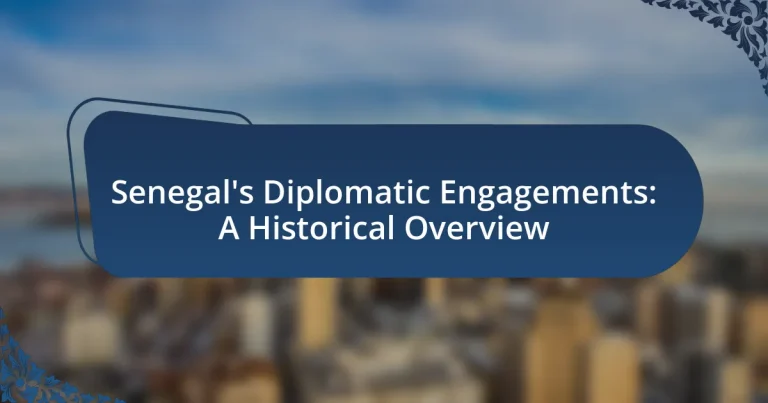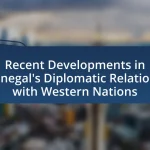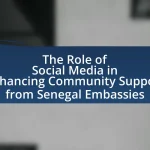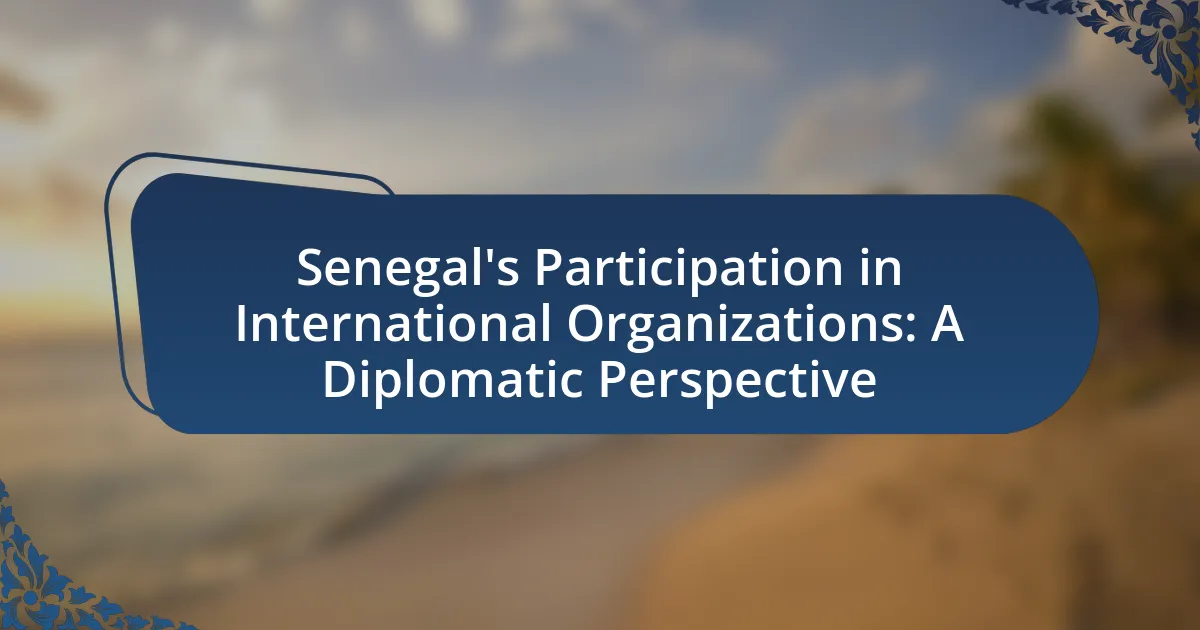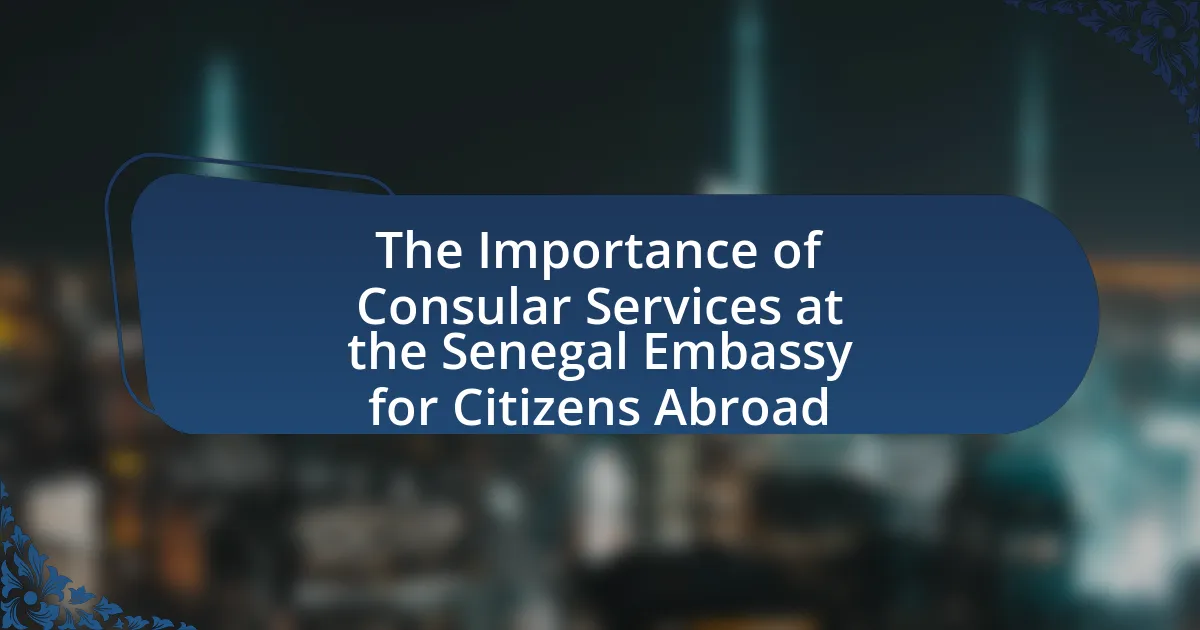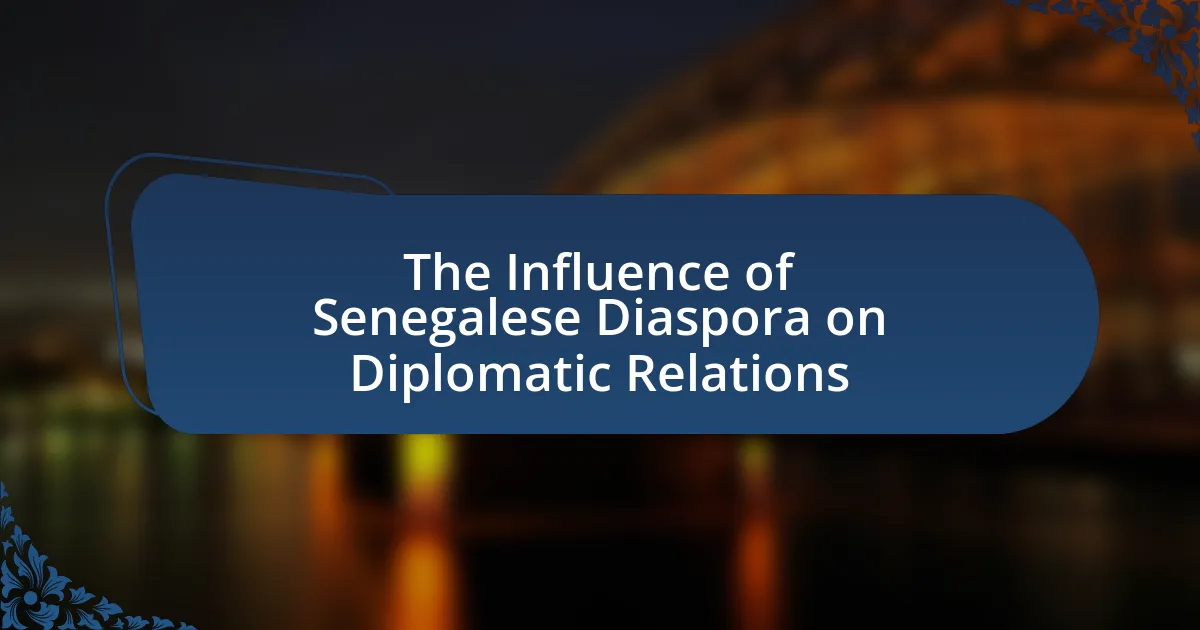Senegal’s diplomatic engagements have evolved significantly since its independence from France in 1960, marking key milestones such as its founding membership in the Organization of African Unity and active participation in the African Union. The country’s colonial past has shaped its foreign policy, emphasizing multilateralism and cooperation with former colonial powers. Senegal’s role in regional diplomacy includes mediating conflicts and contributing to peacekeeping missions, while its relationships with neighboring countries and international partners, particularly France and the United States, highlight its strategic importance. Current challenges include regional instability and economic constraints, which influence Senegal’s diplomatic strategies and future engagements.
What are the key milestones in Senegal’s diplomatic history?
Key milestones in Senegal’s diplomatic history include its independence from France in 1960, which marked the beginning of its sovereign diplomatic relations. In 1963, Senegal became a founding member of the Organization of African Unity, emphasizing its commitment to pan-Africanism. The establishment of diplomatic relations with the United States in 1962 further solidified Senegal’s international presence. In 2000, Senegal played a crucial role in the establishment of the African Union, succeeding the Organization of African Unity. Additionally, Senegal’s hosting of the 2005 World Social Forum showcased its diplomatic engagement in global civil society issues. These milestones reflect Senegal’s active participation in regional and international diplomacy.
How did Senegal’s colonial past influence its diplomatic engagements?
Senegal’s colonial past significantly influenced its diplomatic engagements by shaping its relationships with former colonial powers and fostering a commitment to multilateralism. The legacy of French colonial rule, which lasted from the 17th century until independence in 1960, established deep political, economic, and cultural ties between Senegal and France. This historical connection has led Senegal to often align its foreign policy with French interests, particularly in West African regional matters. Additionally, Senegal’s experience under colonialism has instilled a strong emphasis on cooperation within international organizations, as evidenced by its active participation in the African Union and the United Nations. This commitment is rooted in a desire to promote stability and development in the region, reflecting a broader post-colonial strategy to assert sovereignty while engaging constructively on the global stage.
What were the major treaties and agreements during the colonial period?
The major treaties and agreements during the colonial period in Senegal include the Treaty of Paris (1814), which ceded control of Senegal from the British to the French, and the Treaty of Banjul (1889), which formalized French colonial rule over the region. The Treaty of Paris marked a significant shift in colonial power, establishing French dominance in West Africa. The Treaty of Banjul further solidified French authority, allowing for the expansion of colonial administration and economic exploitation in Senegal. These treaties were pivotal in shaping Senegal’s colonial landscape and its subsequent diplomatic engagements.
How did Senegal’s independence shape its foreign policy?
Senegal’s independence in 1960 significantly shaped its foreign policy by fostering a commitment to non-alignment and regional cooperation. Following independence, Senegal, under President Léopold Sédar Senghor, prioritized building strong ties with other newly independent African nations, promoting the idea of African unity through organizations like the Organization of African Unity (OAU). This approach was rooted in the desire to assert sovereignty and resist neocolonial influences, as evidenced by Senegal’s active participation in peacekeeping missions and diplomatic efforts across the continent. Senghor’s vision emphasized cultural diplomacy and the promotion of African identity, which further solidified Senegal’s role as a mediator in regional conflicts and a proponent of Pan-Africanism.
What role has Senegal played in regional diplomacy?
Senegal has played a significant role in regional diplomacy by acting as a mediator in conflicts and promoting stability in West Africa. The country has been involved in peacekeeping missions and diplomatic negotiations, notably in the Casamance conflict and during the political crises in neighboring countries like Guinea-Bissau and Côte d’Ivoire. Senegal’s commitment to the African Union and the Economic Community of West African States (ECOWAS) further underscores its influence in fostering regional cooperation and conflict resolution.
How has Senegal contributed to the African Union’s initiatives?
Senegal has significantly contributed to the African Union’s initiatives by actively participating in peacekeeping missions and promoting regional stability. The country has deployed troops to various African Union-led missions, such as in Sudan and Somalia, demonstrating its commitment to collective security. Additionally, Senegal has played a pivotal role in advocating for democratic governance and human rights within the African Union framework, exemplified by its support for the African Charter on Democracy, Elections, and Governance. This engagement underscores Senegal’s dedication to fostering unity and cooperation among African nations, reinforcing its position as a key player in the African Union’s efforts to address continental challenges.
What are Senegal’s relationships with neighboring countries?
Senegal maintains cooperative and strategic relationships with its neighboring countries, including The Gambia, Guinea-Bissau, Guinea, and Mali. The relationship with The Gambia is particularly significant due to shared cultural and historical ties, as well as economic collaboration, exemplified by the establishment of the Senegambia Confederation in 1981. Senegal and Guinea-Bissau share economic interests, particularly in trade and fishing, while Senegal’s relationship with Guinea is marked by mutual support in regional stability and development initiatives. Additionally, Senegal has engaged in peacekeeping efforts in Mali, reflecting its commitment to regional security and cooperation. These relationships are reinforced by Senegal’s active participation in regional organizations such as ECOWAS and the African Union, which aim to promote stability and economic integration in West Africa.
What are the significant international partnerships Senegal has formed?
Senegal has formed significant international partnerships with various countries and organizations, notably through its membership in the African Union, the Economic Community of West African States (ECOWAS), and the United Nations. These partnerships facilitate regional cooperation, economic development, and peacekeeping efforts. For instance, Senegal has collaborated with France, its former colonial power, in military and economic initiatives, including joint operations against terrorism in the Sahel region. Additionally, Senegal has engaged with China through investments in infrastructure projects, enhancing trade relations and economic ties. These partnerships are crucial for Senegal’s diplomatic strategy and development goals.
How has Senegal engaged with the United Nations?
Senegal has engaged with the United Nations through active participation in various UN bodies and initiatives since its independence in 1960. The country has contributed troops to UN peacekeeping missions, notably in places like Mali and the Central African Republic, demonstrating its commitment to international peace and security. Additionally, Senegal has served as a non-permanent member of the UN Security Council multiple times, with its most recent term occurring from 2016 to 2017, allowing it to influence global security discussions. Furthermore, Senegal has hosted significant UN conferences, such as the 2001 International Conference on Financing for Development, showcasing its role as a facilitator in international dialogue.
What is the significance of Senegal’s relationship with France?
Senegal’s relationship with France is significant due to its historical, cultural, and economic dimensions. Historically, Senegal was a French colony until gaining independence in 1960, which established a foundation for ongoing diplomatic ties. Culturally, the French language and legal system remain influential in Senegal, shaping its education and governance. Economically, France is one of Senegal’s largest trading partners, with French investments playing a crucial role in sectors such as infrastructure and telecommunications. This multifaceted relationship underscores Senegal’s strategic importance in West Africa and its role as a bridge between Africa and Europe.
How has Senegal’s diplomatic strategy evolved over time?
Senegal’s diplomatic strategy has evolved from a focus on regional stability and non-alignment to active participation in international organizations and multilateral diplomacy. Initially, following its independence in 1960, Senegal prioritized maintaining strong ties with former colonial powers and fostering regional cooperation within West Africa, exemplified by its role in the Organization of African Unity. Over time, Senegal shifted towards a more proactive stance, engaging in peacekeeping missions and advocating for conflict resolution, as seen in its involvement in the United Nations and the African Union. This evolution reflects Senegal’s commitment to promoting peace, security, and development on both regional and global stages, supported by its historical leadership in diplomatic initiatives and mediation efforts in conflicts such as those in Guinea-Bissau and Mali.
What factors have influenced changes in Senegal’s foreign policy?
Changes in Senegal’s foreign policy have been influenced by factors such as regional security dynamics, economic interests, and historical ties with former colonial powers. The need to address security threats from terrorism in the Sahel region has prompted Senegal to strengthen military cooperation with international partners, particularly France and the United States. Additionally, Senegal’s pursuit of economic partnerships, especially in the context of oil and gas discoveries, has led to a shift towards engaging with new global players like China and Turkey. Historical relationships, particularly with France, continue to shape Senegal’s diplomatic stance, as seen in its participation in Francophonie and reliance on French support in various sectors. These factors collectively illustrate the evolving nature of Senegal’s foreign policy in response to both domestic and international contexts.
How have economic considerations shaped Senegal’s diplomatic decisions?
Economic considerations have significantly influenced Senegal’s diplomatic decisions by prioritizing trade partnerships and foreign investment to bolster national development. For instance, Senegal’s strategic location along the West African coast has led to diplomatic efforts aimed at enhancing trade relations with countries like China and the United States, resulting in increased foreign direct investment in sectors such as infrastructure and energy. Additionally, Senegal’s participation in regional organizations like ECOWAS and the African Union reflects its commitment to economic integration, which is essential for accessing larger markets and fostering economic stability. These diplomatic strategies are further supported by Senegal’s efforts to attract international funding for development projects, demonstrating a clear link between economic goals and foreign policy initiatives.
What impact has political stability had on Senegal’s international relations?
Political stability in Senegal has significantly enhanced its international relations by fostering trust and cooperation with other nations. This stability has allowed Senegal to maintain a consistent foreign policy, engage in regional organizations like ECOWAS, and attract foreign investment, evidenced by its role as a mediator in conflicts within West Africa. Furthermore, Senegal’s democratic governance has earned it a reputation as a stable partner, leading to strengthened ties with countries such as France and the United States, which view Senegal as a model for democracy in the region.
How does Senegal approach conflict resolution and peacekeeping?
Senegal approaches conflict resolution and peacekeeping through a combination of diplomatic engagement, regional cooperation, and active participation in international peacekeeping missions. The country has a history of mediating conflicts in West Africa, exemplified by its role in the peace processes in the Casamance region and its involvement in the Economic Community of West African States (ECOWAS) initiatives. Senegal has contributed troops to various United Nations peacekeeping missions, demonstrating its commitment to maintaining regional stability and security. This commitment is further evidenced by Senegal’s hosting of the African Union’s Peace and Security Council meetings, which underscores its leadership role in promoting peace on the continent.
What role has Senegal played in peacekeeping missions in Africa?
Senegal has played a significant role in peacekeeping missions in Africa, contributing troops and resources to various United Nations and African Union operations. Since the 1960s, Senegal has participated in over 20 peacekeeping missions, including notable deployments in countries such as Mali, Côte d’Ivoire, and the Democratic Republic of the Congo. The Senegalese military is recognized for its professionalism and effectiveness in maintaining peace and stability in conflict zones, which has earned the country a reputation as a leader in African peacekeeping efforts.
How does Senegal mediate conflicts between other nations?
Senegal mediates conflicts between other nations primarily through its active participation in regional and international organizations, such as the African Union and the Economic Community of West African States (ECOWAS). The country has a history of diplomatic engagement, exemplified by its role in peacekeeping missions and conflict resolution initiatives, notably in the Casamance conflict and its involvement in mediating disputes in Guinea-Bissau and Mali. Senegal’s commitment to dialogue and negotiation is further supported by its hosting of peace talks and its reputation as a neutral ground for discussions, which enhances its credibility as a mediator.
What are the current challenges facing Senegal’s diplomatic engagements?
Senegal’s diplomatic engagements currently face challenges such as regional instability, economic constraints, and the need for effective multilateral cooperation. Regional instability, particularly in neighboring countries like Mali and Guinea, complicates Senegal’s diplomatic efforts and security collaborations. Economic constraints limit Senegal’s ability to project influence and engage in extensive diplomatic initiatives, as the country must prioritize domestic development. Additionally, the necessity for effective multilateral cooperation is heightened by global issues such as climate change and health crises, which require coordinated responses that Senegal must navigate within its diplomatic framework.
How do global political dynamics affect Senegal’s foreign relations?
Global political dynamics significantly influence Senegal’s foreign relations by shaping its diplomatic strategies and partnerships. For instance, Senegal’s alignment with Western nations, particularly France and the United States, is driven by historical ties and shared interests in security and economic development. Additionally, the rise of China as a global power has prompted Senegal to diversify its foreign relations, leading to increased cooperation with China in infrastructure and investment projects. The geopolitical landscape, characterized by shifts in power and influence, compels Senegal to navigate complex relationships, balancing its traditional alliances with emerging powers to enhance its national interests and regional stability.
What challenges does Senegal face in maintaining its alliances?
Senegal faces several challenges in maintaining its alliances, primarily due to geopolitical shifts, economic dependencies, and internal political dynamics. Geopolitically, the changing influence of global powers in West Africa, particularly from countries like China and Russia, complicates Senegal’s traditional partnerships with Western nations. Economically, reliance on foreign aid and investment can create vulnerabilities, as seen in Senegal’s dependence on France and the European Union for development assistance. Internally, political instability and varying leadership priorities can disrupt continuity in foreign policy, affecting long-term alliances. For instance, Senegal’s recent electoral tensions have raised concerns among its allies regarding stability and governance, which are crucial for sustaining diplomatic relationships.
How does Senegal address issues of security and terrorism in its diplomacy?
Senegal addresses issues of security and terrorism in its diplomacy by actively participating in regional and international security frameworks. The country collaborates with organizations such as the African Union and the Economic Community of West African States to enhance collective security measures. Senegal has also contributed troops to peacekeeping missions in conflict zones, demonstrating its commitment to regional stability. Furthermore, Senegal’s government has implemented counter-terrorism strategies that include intelligence sharing and capacity building with international partners, particularly the United States and France, to combat extremist threats effectively. These diplomatic efforts are supported by Senegal’s historical role as a mediator in regional conflicts, reinforcing its position as a key player in promoting security in West Africa.
What strategies can Senegal employ to enhance its diplomatic influence?
Senegal can enhance its diplomatic influence by strengthening regional partnerships and actively participating in international organizations. By fostering collaboration with neighboring countries through initiatives like the Economic Community of West African States (ECOWAS), Senegal can leverage collective bargaining power and address regional challenges effectively. Additionally, Senegal’s involvement in the African Union and the United Nations allows it to advocate for African interests on a global stage, thereby increasing its visibility and influence. Historical context shows that Senegal has successfully hosted peace talks and served as a mediator in regional conflicts, which further solidifies its role as a diplomatic leader in West Africa.
How can Senegal leverage its cultural diplomacy for international relations?
Senegal can leverage its cultural diplomacy for international relations by promoting its rich heritage, arts, and traditions to foster mutual understanding and cooperation with other nations. By hosting cultural festivals, art exhibitions, and educational exchanges, Senegal can showcase its unique identity and values, thereby enhancing its soft power. For instance, the annual Dakar Biennale attracts international artists and audiences, facilitating cross-cultural dialogue and strengthening Senegal’s global presence. Additionally, Senegal’s historical role as a center for Pan-Africanism and its commitment to peacekeeping in Africa further solidify its position as a cultural ambassador, enabling it to build strategic partnerships and influence international policies.
What role does economic diplomacy play in Senegal’s future engagements?
Economic diplomacy is crucial for Senegal’s future engagements as it aims to enhance trade relations, attract foreign investment, and foster economic partnerships. By leveraging its strategic geographic location and resources, Senegal seeks to position itself as a hub for regional trade and investment in West Africa. The country’s participation in initiatives like the African Continental Free Trade Area (AfCFTA) exemplifies its commitment to economic diplomacy, aiming to boost intra-African trade and economic integration. Furthermore, Senegal’s focus on sectors such as agriculture, energy, and technology highlights its strategy to diversify its economy and create sustainable growth, thereby reinforcing its diplomatic ties with various nations and international organizations.
What best practices can Senegal adopt for effective diplomacy?
Senegal can adopt several best practices for effective diplomacy, including enhancing regional cooperation, prioritizing multilateralism, and investing in diplomatic training. Enhancing regional cooperation through organizations like ECOWAS can strengthen Senegal’s influence and foster stability in West Africa. Prioritizing multilateralism allows Senegal to engage with global issues collaboratively, as seen in its active participation in the United Nations and African Union. Investing in diplomatic training ensures that diplomats are well-equipped with negotiation skills and cultural awareness, which is crucial for successful international relations. These practices are supported by Senegal’s historical commitment to peacekeeping and conflict resolution, exemplified by its role in mediating regional disputes.
